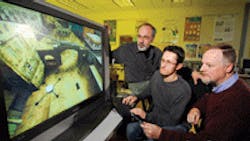Normally, when an individual spends an afternoon staring intently at a TV, using handheld devices to move on-screen vehicles through winding streets, it's called entertainment.
But around the campus of Georgia Tech these days, it's considered serious research aimed at investigating ways in which a robot might move through complex environments.
Researchers from Georgia Tech are studying the technologies, habits and equipment from both digital and real-world games, and then applying those techniques to applications that stretch far beyond entertainment, touching into defense, education, health care and even manufacturing.
While the first on-screen gaming technologies go back more than 30 years, with games such as Pong, the digital revolution produced powerful game "engines" -- the computer code underlying digital games -- that are widely available to developers.
Game technologies are highly user-configurable, using a process calling "modding" (short for modification). That adaptability allows them to be configured in ways designers could have never imagined.
According to Isbell, these technologies have the potential to help answer two of the most complicated issues affecting manufacturing today: training workers and making the programming of software and robots more accessible.
Take, for example, a machinist. Operating complex machinery means having a staff of well-trained machinists that are highly adaptable to changing technology. As the cycle for these technologies gets shorter and shorter, he says, manufacturers need to have ways to rapidly retrain their workers, which requires human investment and capital.
"A lot of the work that I do has to do with the question of adaptive tutors -- rapid machine-generated ways of getting people to learn how to do some task and keep people constantly educated and updated on systems without having to have a lot of human intervention," says Isbell.
Isbell's research also focuses on finding techniques to influence how people behave, especially in groups. In one recent project, Isbell and his team began studying different ways in which to influence human subjects to adopt goals without obvious coercion -- what Isbell calls "computational models of influence."
Video games, he says, typically limit players to a specific area until they've accomplished a specific task. But gaming technologies can be a valuable tool for training if the user feels he or she can pursue tasks on their own, and have a sense of acting of their own free will.
"If you're building games for the sake of entertainment, then you want people to feel like they're in control and they can explore that world," he says. "If it's for the purpose of education or training, you still want to allow people to explore in whatever way is best for them to learn. It's this notion of autonomy on the part of the user -- you need that. And that's what interconnectivity gives you, which is to draw people in and make them more engaged."
That also helps the process of training machines as well. Isbell is studying using gaming concepts such as narrative to help create new approaches to machine learning. Traditionally, machine learning focuses on immediate tasks, rather than on sequences. In other words, the machine knows only what the user is doing -- not what it has done.
"People want to teach in ways that don't line up with the way that systems have traditionally been designed," he says. "But when you bring narrative into the fold, it can have a profound impact on your ability to communicate with machines, interact with machines and get them to accomplish what you need."
A system that learns from a user's behavior -- and is taught correct or incorrect actions -- can inherently be more flexible.
"A user doesn't have to always be an expert," says Isbell. "You can still accomplish quite a bit if the systems are designed to help you. We're trying to create systems that adapt to your needs, as opposed to having to adapt to theirs."
See Also:
• Switch the Way We Shrink Computer Chips
